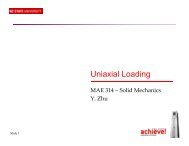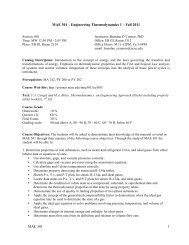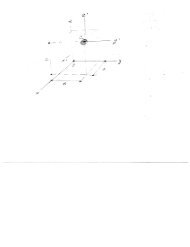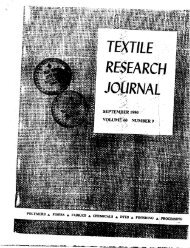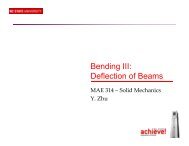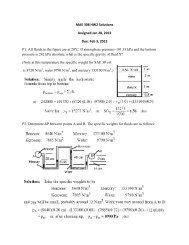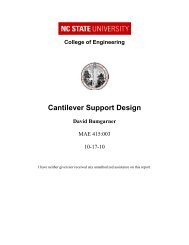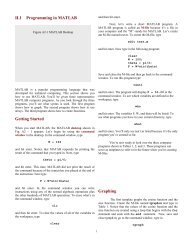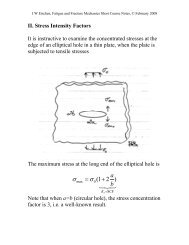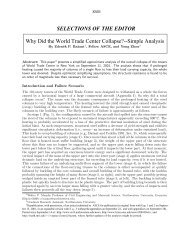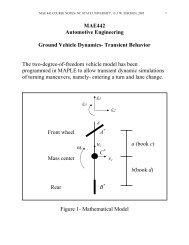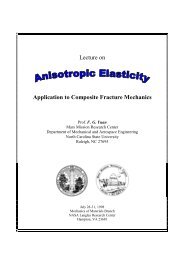The Online Ethics Center for Engineering & Science - Department of ...
The Online Ethics Center for Engineering & Science - Department of ...
The Online Ethics Center for Engineering & Science - Department of ...
Create successful ePaper yourself
Turn your PDF publications into a flip-book with our unique Google optimized e-Paper software.
<strong>Online</strong> <strong>Ethics</strong> <strong>Center</strong>: NSPE Case No. 98-9: Duty to Report Unsafe Conditions/Client Request <strong>for</strong> Secrecysanitary system and the chain <strong>of</strong> command by a letter instructingTechnician B that he is to take responsible charge <strong>of</strong> the sanitary systemand report directly to City Administrator.Although she had already gone beyond her immediate superior bydiscussing the matter with other city <strong>of</strong>ficials and had been relieved <strong>of</strong>responsibility <strong>for</strong> the operation, the Board maintained that Engineer Ahad a further responsibility to report a matter endangering the publicsafety and health to the proper authorities.While the Board noted earlier that the Code makes no direct exception tothe language contained in Section III.4., as we have stated on numerousoccasions, no section <strong>of</strong> the Code should be read in a vacuum orindependent <strong>of</strong> the other provisions <strong>of</strong> the Code. Section II.1.c. providesadditional guidance in this case making it clear that the Engineer A hasan ethical obligation to refrain from disclosing in<strong>for</strong>mation which sheacquires during the course <strong>of</strong> providing pr<strong>of</strong>essional services to the clientunless first obtaining the client's consent to disclose. Importantly,however, this section also includes a relevant exception that allows theengineer to disclose in<strong>for</strong>mation acquired during the course <strong>of</strong> providingpr<strong>of</strong>essional services to the client if such disclosure is authorized orrequired by law or by the Code. In other words, if the engineer has a legalor ethical responsibility to disclose the in<strong>for</strong>mation in question, theengineer is released from the obligation to maintain confidentiality.Much <strong>of</strong> the same reasoning applies in the present case. Under thereasoning <strong>of</strong> BER Case 88-6, the engineer had an obligation to g<strong>of</strong>urther. As earlier stated, we believe under the facts, Section II.1.c.should be read in conjunction with Section II.1.a. <strong>The</strong> latter section refersto the primary obligation <strong>of</strong> the engineer to protect the safety, health,property and welfare <strong>of</strong> the public. <strong>The</strong> obligation <strong>of</strong> the engineer torefrain from revealing confidential in<strong>for</strong>mation, data, facts concerning thebusiness affairs <strong>of</strong> the client without consent <strong>of</strong> the client is a significantethical obligation. We further believe that matters <strong>of</strong> public health andsafety must take precedence. Again, the Code <strong>of</strong> <strong>Ethics</strong> is clear on thispoint -- Section I.1. employs the word "paramount" to describe theobligation <strong>of</strong> the engineer with respect to the public health and safety.Engineer A's actions in promptly reporting his findings to the client andproviding a corrective design were both ethical and commendable.Nevertheless, the necessary repairs require months be<strong>for</strong>e the building'sstability could be ensured. During that time, the building's occupantsalong with a large area <strong>of</strong> the city, remained in jeopardy, with only anuntested evacuation plan protecting them from possible disaster.<strong>The</strong> desire to avoid public panic is certainly a legitimate factor indeciding upon a course <strong>of</strong> action. However, withholding criticalin<strong>for</strong>mation from thousands <strong>of</strong> individuals whose safety is compromisedover a significant period <strong>of</strong> time is not a valid alternative <strong>for</strong> theconditions presented.It would seem that Engineer A should have in<strong>for</strong>med the client and thearchitect that, while he has an obligation <strong>of</strong> confidentiality to them ashttp://onlineethics.org/cases/nspe/nspe98-9.html (4 <strong>of</strong> 6)10/25/2005 9:07:58 AM




